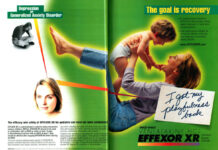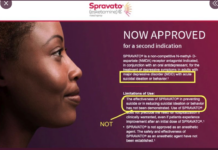With the American Medical Association (AMA) declaring its opposition to direct-to-consumer (DTC) drug advertising, Martha Rosenberg asks, did DTC increase the number of people who have “diseases”? “’Are there periods of time when you have racing thoughts? Fly off the handle at little things? Spend out of control? Need less sleep? Feel irritable? You may need treatment for bipolar disorder,’ read print ads in major magazines for Seroquel when it was first approved for bipolar disorder. Of course the person with racing thoughts could also just be drinking too much coffee or be experiencing stress at work.”
-
We do need to get rid of DTC advertising, it’s nothing but disease mongering, especially of the unprovable and invalid DSM “disorders.” And DTC advertising of the pharmaceutical drugs has given us a mainstream media which does not honestly address problems with the pharmaceutical drugs – can’t bite the hand that feeds it.
“Spend out of control?” Proof I had “bipolar” was a $400 donation to a children’s charity. “Feel irritable?” And irritation at some bullies who wanted to cover up medical evidence of child abuse and easily recognized medical malpractice.
Is a small donation to a charity actually proof of a “life long incurable, genetic mental illness”? And is justified irritation at unethical, child abusing bullies and incompetent doctors really “bipolar”?
It strikes me the psychiatric industry is nothing but a gas lighting industry for the unethical and incompetent. So it’s time we rid the world of the invalid and unreliable DSM, too. Especially since it does appear the number one etiology of “schizophrenia” today is psychiatrists profiting off of misdiagnosing abused children as “psychotic.”
http://psychcentral.com/news/2006/06/13/child-abuse-can-cause-schizophrenia/18.html
Then likely creating either the negative symptoms of “schizophrenia” via:
“Neuroleptic induced deficit syndrome is principally characterized by the same symptoms that constitute the negative symptoms of schizophrenia—emotional blunting, apathy, hypobulia, difficulty in thinking, difficulty or total inability in concentrating, attention deficits, and desocialization. This can easily lead to misdiagnosis and mistreatment. Instead of decreasing the antipsychotic, the doctor may increase their dose to try to ‘improve’ what he perceives to be negative symptoms of schizophrenia, rather than antipsychotic side effects.”
And increasing the neuroleptic dose, or adding more drugs, can result in the positive symptoms of “schizophrenia” via neuroleptic or poly pharmacy induced anticholinergic intoxication syndrome in the abused children.
“Central symptoms [of anticholinergic intoxication syndrome] may include memory loss, disorientation, incoherence, hallucinations, psychosis, delirium, hyperactivity, twitching or jerking movements, stereotypy, and seizures.”
“Substances that may cause this toxidrome include the four ‘anti’s of antihistamines, antipsychotics, antidepressants, and antiparkinsonian drugs[3] as well as atropine, benztropine, datura, and scopolamine.” The exact same drug classes recommended to cure “bipolar” today.
It appears to me that the DSM is a “bible” describing the iatrogenic illnesses created by the psychiatric drugs and drug cocktails, not a book describing genetic illnesses.














